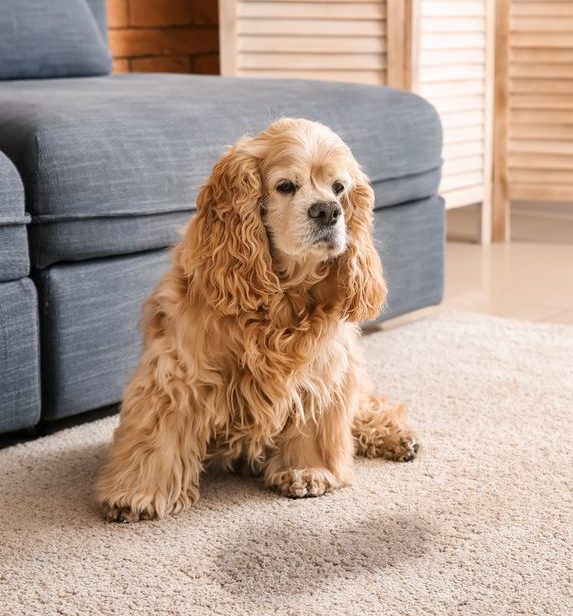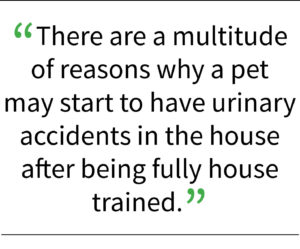Sometimes “accidents” in the house are the result of an overproduction of urine

By Jeanne Haggerty-Arcay
As pet owners, we have each felt that sense of accomplishment when the house training of a puppy is finally complete. No more accidents and late night trips outside. Everyone is finally on the same schedule and the household runs smoothly . . . until it doesn’t. One wet spot on the floor or bed can be dismissed but beyond that you know something is just not right. Is there something medically wrong or has my dog lost his house training?
There are a multitude of reasons why a pet may start to have urinary accidents in the house after being fully house trained. One of the more common causes is urinary tract infections. As in humans, UTIs can cause urgency, discomfort, bloody urine, straining to urinate and oftentimes accidents in the house. A course of antibiotics are typically effective in treating these infections.
Bladder stones can also cause similar symptoms and these pets will often have a UTI in addition to the stones. Stones can develop in response to an animal’s particular metabolism, in response to chronic UTIs, or can be the result of hereditary conditions. Most bladder stones can be easily detected on X-rays. If stones are found, a sample of urine should be sent to the lab to look for infection and other factors that will help determine how to treat the stones. Some stones can be dissolved with special prescription diets while others require surgical removal.
 Urinary incontinence is a relatively common occurrence in spayed females. Although the condition can occur at any point after being spayed, it tends to occur more commonly in middle aged to older dogs. Estrogen plays a role in maintaining a tight urinary sphincter.
Urinary incontinence is a relatively common occurrence in spayed females. Although the condition can occur at any point after being spayed, it tends to occur more commonly in middle aged to older dogs. Estrogen plays a role in maintaining a tight urinary sphincter.
During a routine spay, the ovaries are removed, leaving the dog without the effects of estrogen. Over time, the urinary sphincter can become “loose” and the dog can start to develop urinary leakage or incontinence.
Many owners will first notice small amounts of wetness on the pet’s bed. The amount of leakage typically increases over time without treatment. When the urinary sphincter is “loose” or incompetent, it not only gives the opportunity for urine to leek out but also bacteria to get into the bladder. These dogs are prone to UTIs and often have an infection in addition to incontinence. The UTI can be treated with antibiotics but the incontinence requires more long term medication.
Sometimes accidents in the house are the result of an overproduction of urine. This can occur with common conditions such as diabetes, Cushing’s disease and kidney disease. Dogs do sometimes exhibit behavioral urination in the house after being properly house trained. It is most commonly seen during rainy/stormy times when pets are reluctant to go outside, when there is a significant change in the home environment (such as a new baby, a new pet or a move to a new home) or in a pet that has pre-existing anxiety issues.
If you think your previously trained pet has started urinating in the house, talk with your veterinarian. He/she can help decide which tests are appropriate. It may be a symptom of anything from a simple UTI to a more serious disease. But it is nothing to be ignored.






